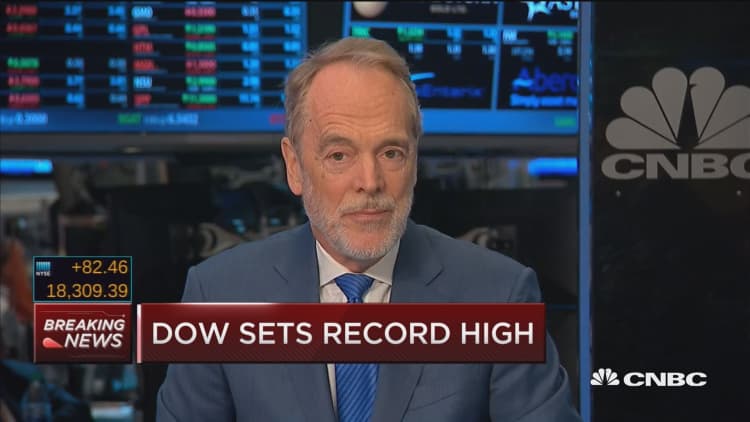The European banking sector is one of the worst hit sectors in the wake of the U.K. voting to leave the European Union. While most banks have seen their share prices fall, concerns over Germany's Deutsche Bank's performance had started to rattle both investors and financial markets well before the vote.
The bank's shares are down nearly 43 percent since the start of the year and nearly 20 percent since the referendum results were announced. Billionaire investor George Soros had earlier made a $111 million bet that Deutsche Bank stock would fall in the wake of the Brexit vote. However, Deutsche Bank's shares were seen to be trading more than 3 percent higher at 12.9 euros on Friday.
While the fall in Deutsche Bank's share price is not very different from some other banks like the Royal Bank of Scotland for instance, down nearly 40 percent since the beginning of the year, it faces regular comparisons with the ill-fated Lehman Brothers.
Add to that the bank's falling market valuation, currently pegged at $18 billion, similar to that of social network company Snapchat, and investors are increasingly worried. Deutsche Bank declined to comment on the concerns surrounding the bank.
Troubling times ahead?
The cost of insuring exposure to Deutsche Bank debt has risen sharply, signaling it as a risky asset and inviting further comparisons with Lehman Brothers. Five-year credit default swaps (CDS) are aaround 230 basis points currently, the highest among all investment banks, and a massive jump from 95 basis points at the start of the year, according to data from Markit. Reports have also pointed to Deutsche Bank's global derivatives risk in the range of $75 trillion which is 20 times greater than the German gross domestic product (GDP).
However, sources close to the bank told CNBC that it has a very strong funding base of client deposits which puts it at a much better position when compared to Lehman Brothers. The bank has a strong retail operation globally with over $220 billion of liquidity and is headquartered in Frankfurt, putting it in a better position than other banks that may look at exiting the U.K. The bank has also restructured, cutting 80 percent of its risk weighted assets in non-core in 2012. But worries surrounding the bank persist.
In the past few months, one of its U.S. businesses failed a Federal Reserve stress test. Shares in the bank hit fresh lows after the International Monetary Fund branded Deutsche Bank one of the riskiest banks globally. Referring to Deutsche Bank as a "globally systemically important financial institutions," the report pointed to Deutsche Bank as the most important net contributor to systemic risks, followed by HSBC and Credit Suisse.
"The relative importance of Deutsche Bank underscores the importance of risk management, intense supervision of [globally systemically important banks] and the close monitoring of their cross-border exposures, as well as rapidly completing capacity to implement the new resolution regime," the IMF said in its report.
Internal confusion?
Critics of Deutsche Bank have also pointed to the management reshuffle and movement of personnel as one of the reasons for the bank's poor performance. Last year saw a change in Deutsche Bank's senior management team after Co-Chairmen Anshu Jain and Jurgen Fitschen stepped down, giving way to John Cryan, the former UBS boss, as the new CEO.
Anshu Jain's decision to step down was followed by a number of high profile exits from the bank's key operations including Zar Amrolia, who was the bank's head of fixed-income and currencies business, Colin Fan, the bank's co-head of the investment bank and Michele Faissola, the head of the asset and wealth management business.
While the new CEO, who had been part of the Deutsche Bank supervisory board since 2013, is said to have brought changes to the bank's overall strategy, investors nonetheless fear a repeat of September 2008, when Lehman filed for bankruptcy.
Although a number of reports have pointed to the bank in a transition phase ever since the new management took over, sources told CNBC fixed income traders are not very happy with the appointment of Garth Ritchie, an equities specialist, as the new head of global markets.
Ritchie was earlier the head of equities at Deutsche Bank and took over in December 2008. The bank's equities business was down nearly 60 percent in the first nine months of 2008 but Ritchie is said to have redesigned the business and changed it from a proprietary shop to a client-facing shop.

Troubles however continue as analysts remain uncertain of the bank's future. Deutsche Bank's chief economist is nonetheless optimistic about his employer. Recently, in an interview with Welt am Sonntag, David Folkerts-Landau said he had bought 10,000 shares of the bank and was upbeat about the bank's future.
He was less optimistic about the future of the banking sector in general. In the same interview, Folkerts-Laundau said Europe urgently needs a 150-billion-euro bailout fund to recapitalize its ailing banks, particularly those in Italy.
"We are witnessing one crisis after another and I can, by no stretch of the imagination, make out growth prospects anywhere," Folkerts-Landau said.


